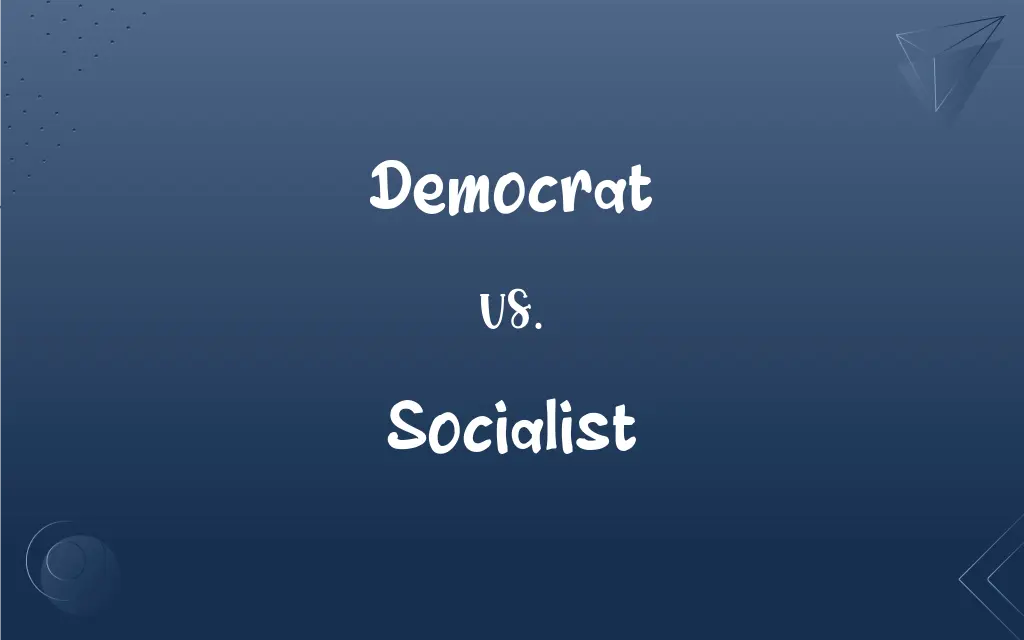Democrat vs. Socialist: What's the Difference?
Edited by Aimie Carlson || By Harlon Moss || Updated on October 22, 2023
A "democrat" supports democracy and is a member of the Democratic Party in the U.S., while a "socialist" advocates for collective or governmental ownership of production and distribution.

Key Differences
"Democrat" and "socialist" are terms that can evoke strong opinions and discussions, especially in political circles. A democrat, in a broad sense, champions the principles of democracy where power is exercised by the people. In the U.S., "Democrat" also specifically refers to a member or supporter of the Democratic Party. On the other hand, a socialist advocates for a system where production, distribution, and exchange should be owned or regulated by the community as a whole.
The term "democrat" emphasizes the process of governance and the belief in majority rule, individual rights, and equality. It doesn't necessarily dictate specific economic policies. Conversely, "socialist" zeroes in on the economic and social systems, suggesting methods where wealth and power are distributed more evenly among the populace.
In the U.S. political landscape, the Democratic Party, where democrats align, encompasses a broad range of views, from moderate to progressive. Not all Democrats are socialists. Socialists, meanwhile, may or may not identify with the Democratic Party; some might align more with third-party movements, like the Socialist Party.
Globally, the context shifts. Many countries have both democratic governance and socialist-leaning policies. It's essential to discern that being a democrat doesn't exclude one from also holding socialist views, and vice versa.
In essence, while "democrat" and "socialist" can intersect in ideologies, they have distinct origins and emphases: the former on political process and governance, and the latter on economic systems and societal organization.
ADVERTISEMENT
Comparison Chart
Primary Focus
Governance, political process.
Economic system, wealth distribution.
U.S. Context
Member/supporter of the Democratic Party.
Advocates community/government ownership of resources.
Economic Policy
Varies, not specific to the term.
Emphasizes collective ownership/control.
Political Parties
Democratic Party in the U.S.
Socialist Party, among others.
Global Context
Supports democratic governance.
Can be found in various democratic nations with socialist policies.
ADVERTISEMENT
Democrat and Socialist Definitions
Democrat
An individual opposing aristocratic or monarchical rule.
As a democrat, she challenged the old monarchy's norms.
Socialist
An advocate for the equal distribution of wealth and resources.
Believing in equality, she identifies as a socialist.
Democrat
Someone committed to the principle of majority rule.
As a democrat, he stressed the importance of every vote.
Socialist
A person advocating for collective/governmental ownership of production and distribution.
As a socialist, she believes in healthcare for all.
Democrat
One who believes in equal rights and opportunities for all.
Advocating for equal representation, he proved to be a true democrat.
Socialist
Someone who opposes the capitalist system.
As a socialist, he often critiques the disparities in wealth distribution.
Democrat
A member or supporter of the Democratic Party in the U.S.
As a democrat, he always attends the party's conventions.
Socialist
A member of a political party or group promoting socialism.
He joined the socialist party to drive change in his community.
Democrat
An advocate of democracy.
Socialist
A person who believes in social cooperation over competition.
He's a socialist who values community collaboration.
Socialist
An advocate of socialism.
FAQs
Can a country be both democratic and socialist?
Yes, many countries combine democratic governance with socialist policies.
Does socialism oppose private property?
Not necessarily. Some socialists support private property but advocate for collective control of major industries.
Do Democrats always support socialist policies?
No, views within the Democratic Party vary widely.
Are all Democrats socialists?
No, the Democratic Party encompasses a range of views, not all are socialist.
What's the difference between socialism and communism?
Both advocate collective ownership, but communism seeks a classless society and often involves more centralized control.
Are there socialist parties in the U.S.?
Yes, there are parties like the Socialist Party USA, separate from the Democratic Party.
Can a democrat support capitalist policies?
Yes, being a democrat pertains to governance, not necessarily economic policy.
Is Bernie Sanders a democrat or socialist?
Bernie Sanders identifies as a Democratic Socialist and caucuses with Democrats in the Senate.
Do all socialists oppose corporations?
Views vary, but many criticize corporate power or advocate for more regulations.
Does being a democrat mean opposing monarchies?
Not necessarily. Many democratic countries retain constitutional monarchies.
Are Democrats in the U.S. more liberal?
Generally, they lean liberal compared to Republicans, but the party has a range of views.
How old are the terms "democrat" and "socialist"?
Both have roots in the 18th and 19th centuries, respectively.
Is Democratic Socialism the same as socialism?
Not exactly. Democratic Socialism combines socialist economic beliefs with a democratic political system.
Is socialism purely economic?
Primarily, but it also encompasses broader societal views on equality and justice.
Is socialism always state-controlled?
No, socialism can involve community or cooperative control, not just state ownership.
Why is "democrat" capitalized sometimes?
When referring to the U.S. political party, it's capitalized. Otherwise, it's lowercase.
Is "Democrat" only a U.S. term?
While globally it means a supporter of democracy, in the U.S., it's also a political party member.
Is socialism left-wing?
Generally, socialism is considered left-wing, but political spectrums can vary by country.
What's the main goal of socialism?
A primary goal is the equitable distribution of wealth and societal resources.
Are there different types of socialism?
Yes, including Democratic Socialism, Marxist Socialism, and more.
About Author
Written by
Harlon MossHarlon is a seasoned quality moderator and accomplished content writer for Difference Wiki. An alumnus of the prestigious University of California, he earned his degree in Computer Science. Leveraging his academic background, Harlon brings a meticulous and informed perspective to his work, ensuring content accuracy and excellence.
Edited by
Aimie CarlsonAimie Carlson, holding a master's degree in English literature, is a fervent English language enthusiast. She lends her writing talents to Difference Wiki, a prominent website that specializes in comparisons, offering readers insightful analyses that both captivate and inform.































































